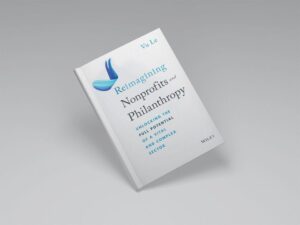
Why would NPQ prepare a special focus on self-interest both well and badly used in nonprofits? Because the topic of conflicts of interest has presented itself so often recently in investigations of large, well-known nonprofits, imbuing the sector with reasons for the public to be skeptical about its intentions.
Over the last few years, some high-profile stories have surfaced about conflicts of interest among board and staff leaders. In many of these stories, the defense posed in even the most egregious of cases was a kind of wide-eyed wonder at the fact that anyone would think such behavior was out of line.
And, indeed, conflicts of interest are a slippery slope—which is why at NPQ we have always suggested that it is just better to steer clear of them altogether.
This includes, by the way, disclosures and recusals, which are a poor proxy for actual avoidance of conflicts. Even as we go to press, the public is being treated to a bird’s-eye view of the various ways in which executives and board members at the NRA have improperly profited from their leadership positions. As a result of the disclosures, the organization is losing donors, along with any credibility it still had. Add this to the millions of dollars that have gone into questionable expenses, and you have an organization in serious decline.
Sign up for our free newsletters
Subscribe to NPQ's newsletters to have our top stories delivered directly to your inbox.
By signing up, you agree to our privacy policy and terms of use, and to receive messages from NPQ and our partners.
But these are the obvious types of conflicts; many are more subtle. And the opportunity to stray into dangerous territory in nonprofit life is omnipresent, requiring strong ethical practices and protocols to identify and avoid problematic situations. In each organization, the temptations may be slightly different; but when nonprofits fall prey to those temptations, they run risks for which, often, they can only barely imagine the consequences.
Those consequences can include reputational damage all around, and in some cases massive organizational losses and organizational and personal humiliation.
This cluster of articles, to be run over the next two weeks, includes the article we are running today, “Charity Conflicts of Interest: A Guide” by Dr. David Renz; an astute and practical examination of why recusals and disclosures are inadequate to the problem by the always insightful Vernetta Walker, who knows nonprofit boards like the back of her hand; and an article by NPQ’s Ruth McCambridge, on the role self-interest plays in nonprofit life in—as Minnesota Council of Nonprofits’ Jon Pratt calls it—“the nonprofit wing of the nonprofit sector.”
To complete the set, late last week we ran a wonderfully irreverent meditation called “We Are All Ducks: Othering and Enlightened Self-Interest in the Nonprofit Sector” by Vu Le of Rainier Valley Corps. He explores the notion of enlightened self-interest in nonprofits and philanthropy.










